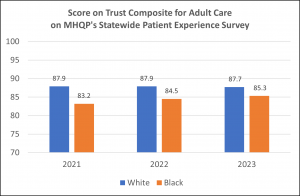MHQP Receives PCORI Award to Help Address Mistrust in Healthcare within the Black Community
(August 2024)
MHQP is pleased to announce that we have received a funding award through the Eugene Washington PCORI Engagement Award Program, an initiative of the Patient-Centered Outcomes Research Institute, to identify new research directions to address mistrust in healthcare within the Black community. This work will be conducted in collaboration with team members from Boston Medical Center’s implementation of the National Institute of Health’s Community Engagement Alliance (NIH CEAL), the Boston Public Health Commission, and American Board of Family Medicine.
This project is part of MHQP’s expanding health equity portfolio, which has included work on inequities in pain care for people with sickle cell disease and endometriosis, in addition to MHQP’s Measured Equity initiative. MHQP and its partners will build upon that work by bringing together patients and primary care providers to collaboratively shape a future research agenda to help identify effective interventions to reduce mistrust for Black patients to ensure they can achieve the care outcomes they desire and deserve.
MHQP has been exploring lack of trust as an impediment to patients getting the right care at the right time. MHQP began including questions about trust in our Statewide Patient Experience survey in 2021. In that year and in the two subsequent years, Black patients reported statistically significant lower levels of trust than their White counterparts.
 Mistrust within the Black community towards health care services has deep roots, stemming from racism and a legacy of historical injustices, including discriminatory practices and the exploitation of Black individuals in medical research. This results in lower retention rates, decreased utilization of preventive services, subpar experiences, and adverse health outcomes.
Mistrust within the Black community towards health care services has deep roots, stemming from racism and a legacy of historical injustices, including discriminatory practices and the exploitation of Black individuals in medical research. This results in lower retention rates, decreased utilization of preventive services, subpar experiences, and adverse health outcomes.
Overcoming these challenges necessitates a comprehensive understanding of the multi-faceted nature of mistrust and the development of targeted interventions that address the unique needs and concerns of Black patients. Primary care in particular holds a pivotal role in establishing trust, ultimately contributing to enhanced health outcomes and the mitigation of health disparities.
“Disparities in the trust patients feel about their healthcare system are simply unacceptable,” said Molly Totman, MPH, MHQP’s Senior Director of Quality Initiatives. “We must find ways to reduce these gaps, and creating a meaningful research agenda is a critical step. We look forward to making meaningful contributions to this important issue.”
“Medical mistrust is one of the root causes of the pervasive racial inequities in health outcomes that have been documented throughout our country,” said Dr. Bisola Ojikutu, Commissioner of Public Health for the City of Boston and Executive Director of the Boston Public Health Commission. “In Boston, we have prioritized health equity and developing strategies to build trust between our health care system and our diverse communities is one important way to do so.”
“The research is clear — medical mistrust is responsible for poorer health outcomes, higher rates of chronic disease, and increased mortality in traditionally marginalized communities,” said Katherine Gergen Barnett, MD, Vice Chair for Primary Care Innovation and Transformation at Boston Medical Center. “And yet to date, very few organizations are addressing it in a systematic, patient-centered way. MHQP is a trusted partner in healthcare in Massachusetts and is a perfect partner to analyze and address mistrust. We at Boston Medical Center are looking forward to this collaboration and to walking one step closer to health equity in our communities.”
“The ABFM is committed to better understanding trust in primary care and its impact in addressing a critical health equity issue: the mistrust of the healthcare system among patients of color,” said Andrew Bazemore MD, MPH, ABFM’s Senior Vice President for Research and Policy. “By partnering with MHQP, whose work to advance high quality primary care is widely recognized, we aim to enhance the patient-provider relationship in primary care, fostering an environment where patients feel heard, valued, and actively engaged in their healthcare decisions.”
If you would like to learn more about this project, please contact Molly Totman at mtotman@mhqp.org.
